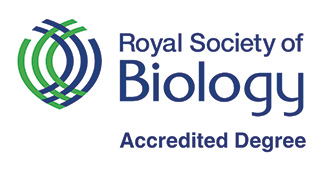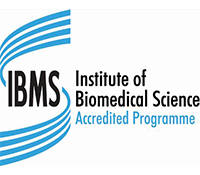BSc Biomedical Science with Professional Experience
-
UCAS code
C743 -
A level offer
ABB -
Year of entry
2026/27 -
Course duration
Full Time: 4 Years
-
Year of entry
2026/27 -
Course duration
Full Time: 4 Years
Learn about the inner workings of the human body and take part in world-class research through our practical BSc Biomedical Sciences with Professional Experience course.
Our BSc Biomedical Science course is IBMS accredited and developed in partnership with practising NHS laboratory scientists. This degree is specifically geared towards becoming a biomedical scientist, working in hospital and private clinical labs to help doctors diagnose and treat diseases. To work as a biomedical scientist in the UK, you'll need to register with the Health and Care Professions Council (HCPC).
All of our lecturers are involved in research and you will be taught by experts in their fields. 92% of BSc Biomedical Science students of our students said the course often challenges them to achieve their best work (National Student Survey 2025, 91.7% of responders from BSc Biomedical Sciences).
You will learn about the systems that underpin all living organisms from a cellular, tissue, organ and whole body perspective. From this basis, you will study the diseases that affect each area and the mechanisms that the body uses to combat them.
The course has a strong practical basis, and you will learn key cellular, molecular and biochemical techniques, including live cell microscopy, and DNA and protein technology. You will benefit from our long-standing links with the Royal Berkshire Hospital – some teaching is delivered by practising NHS laboratory scientists. During your final year will have the chance to spend 11 weeks working in a lab on a biomedical research project, on topics as diverse as SARS, HIV, influenza, heart disease, cancer neurodegeneration and obesity.
Our new £60m Health and Life Sciences building is the home of the School of Biological Sciences. It offers state-of-the-art research and teaching laboratories, seminar rooms, and plenty of study and social space, including a café.
Placement
You will have the opportunity to carry out a year-long industrial placement between your second and final year. Undertaking your placement in an accredited NHS training lab allows you to work towards the IBMS Certificate of Competence and the Registration Training Portfolio during your degree. Or you could choose to undertake a more broad placement to prepare you for a wider range of careers.
Students in previous years have worked at NHS training labs as well as Public Health England, GSK, and Covance. You can also choose to spend a year abroad, typically carrying out research in an academic laboratory.
You will have the opportunity to undertake paid vacation studentships funded by organisations such as the Wellcome Trust. These can take place over six weeks during the summer break, or be carried out part-time over a longer period. During studentships you will typically work on a set project and benefit from valuable training in techniques, experimental design and the interpretation of data.
Our department has a dedicated academic in charge of placements, who can provide you with advice and support.
For more information, please visit the School of Biological Sciences website.



